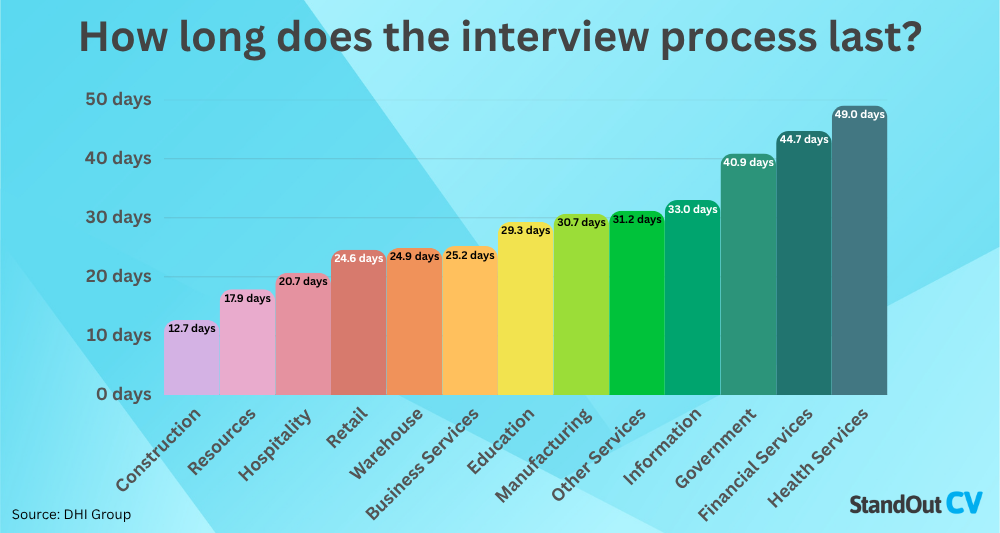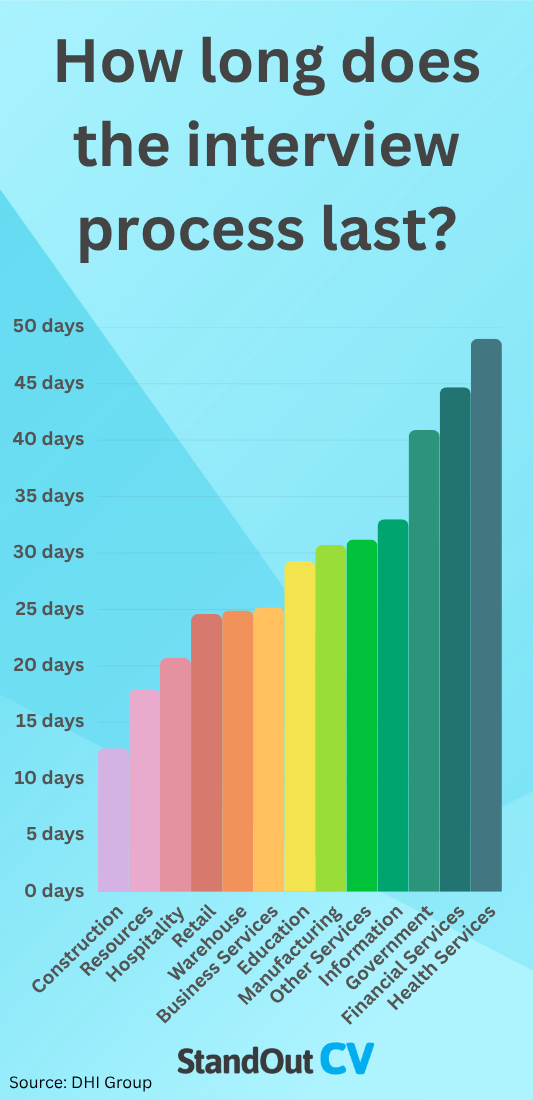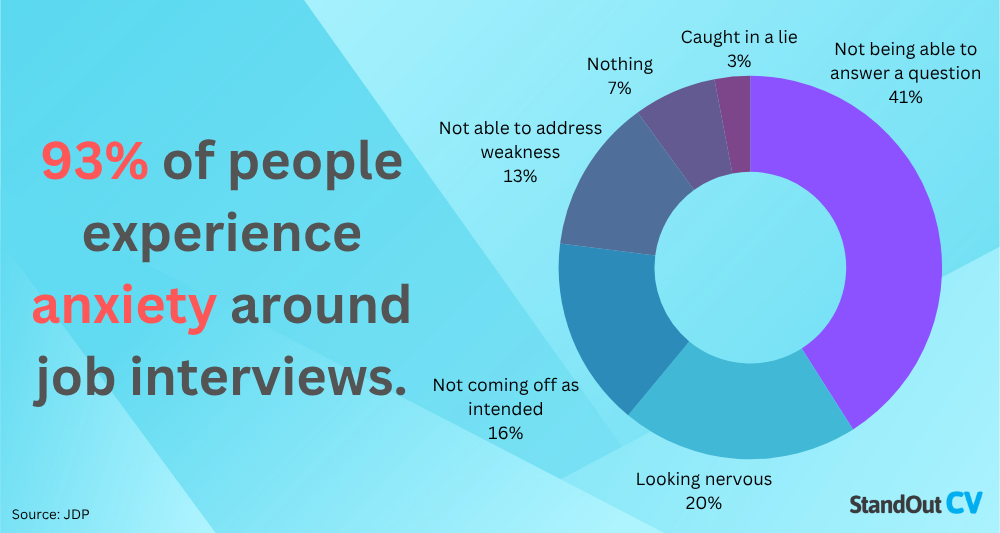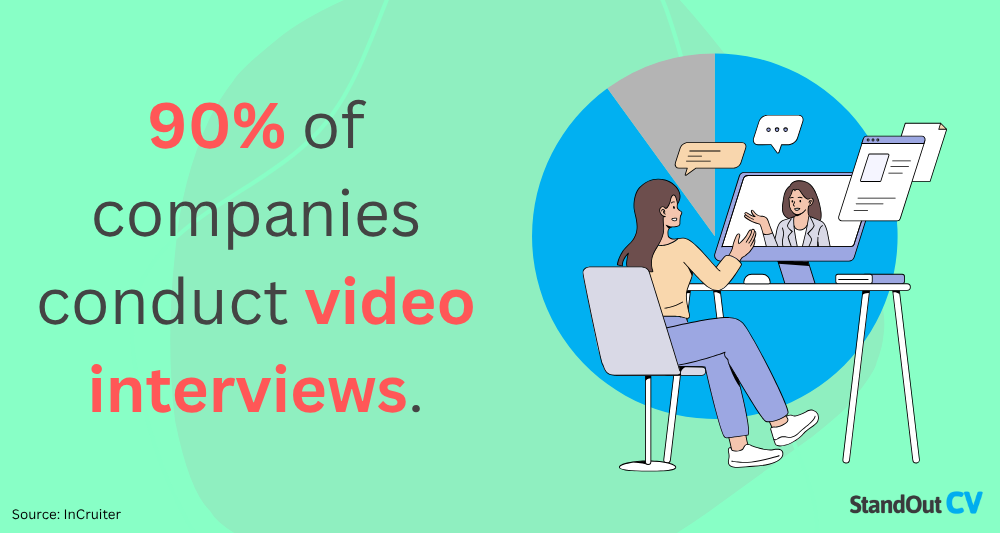A job interview can open the door to a career-changing opportunity – or close it just as quickly.
I’ve dug into the latest essential UK job interview statistics for 2025 to show you what’s really going on: from how candidates get that all-important invitation to what happens after the questions stop, and what the future of interviews might hold.
Key job interview statistics
- Only 2% of candidates are selected to interview for the job they applied for.
- Following the first interview, the entire interview process usually takes 5 weeks, on average.
- 9 in 10 companies use video interviews in the initial stages of the hiring process.
- 62% of candidates have experienced technical difficulties during a virtual interview.
- 20% of companies are using AI to help interview candidates; 94% say it’s helped improve how they field and hire applicants.
- On average, a single interview can cost a candidate £54.41 in expenses.
- 1 in 3 candidates have experienced bias or discrimination during the interview process.
- More than half of all candidates have been ghosted by a recruiter.
Getting a job interview
The first hurdle in the recruitment process is securing a job interview – here are the latest statistics on the process of landing the all-important interview.
How many people apply for one job?
According to a 2025 study from recruitment platform Ashby, every job advert receives an average of 340 applicants – that’s a 182% increase from 2021.


How long do recruiters spend looking at CVs?
Based on numerous studies and insight from leading recruitment experts, our own research found that recruiters spend an average of 30 seconds looking at a CV.
- 1 in 2 recruiters will spend more time looking at an application from a candidate who has been referred by someone else.
- Fewer than 1% of recruiters claim to spend less than 10 seconds reading a CV.
How many candidates are selected for interview?
The vast majority of applicants are unsuccessful – B2B solutions provider Contentree’s 2024 research discovered that only 2% of applicants receive an interview.
A study by Workopolis found that 80% of applicants don’t make it past a recruiter’s initial skim read.


How long does it take to get a job interview?
The average candidate has to wait 2 to 3 weeks to schedule their first interview, according to scheduling software provider Cronofy’s 2024 report.
- Only 1 in 10 British candidates managed to schedule an interview in a day or less.
- From creating their CV to securing a final job offer, it takes about 16 weeks to land a job in the UK, according to our earlier study.
Arranging and preparing for a job interview
From travel logistics to what candidates wear, these stats concern the tangible preparations interviewees make beforehand.
Cost of attending a job interview
Research from Moneypenny found that a single UK interview can cost a candidate £54.41 – that’s over £163 for a typical three-stage interview process.
How long do candidates spend preparing for interviews?
Indeed determined that a candidate will typically spend 5 to 10 hours preparing for an interview. This includes time spent reviewing their CV, researching the company, and practicing questions and answers.
Do most candidates research the company beforehand?
Indeed’s 2024 Workforce Insights Report found that 54% of candidates research the company before they walk into an interview. Most candidates – 74% – research salary information, while 25% look into the CEO and company leadership.
What to take to a job interview
The most common thing candidates take to their interview is their CV – 90% of interviewees do so, according to a study by JDP.
60% bring their references, 29% bring a portfolio of their work, and 20% bring a beverage.


What to wear for a job interview
A survey by Jobvite found that 24% of interviewers consider “dressing too casually” a deal-breaker, indicating that formal attire is important to forming the first impression.
The interview process
These stats cover the structure, length, and format of interviews used through the recruitment process.
How many people interview for one job?
Recruitment software provider Ashby found that their teams interviewed, on average, 15.4 applicants per job opening.
How many stages do interview processes have?
Aptitude Research states that more than half of companies structure 4 or more stages to their interview process. They state that a longer interview process does not necessarily equate to better hiring decisions, and recommend fewer stages.
How long does the job interview process last?
Findings from Aptitude Research found that from the first interview, the process lasts 4 to 6 weeks for 52% of companies.
- Half of companies surveyed believe that their interview process is too long.
- 40% of candidates waited over 2 weeks before hearing back after their first interview.
- Cronofy found that the majority of candidates would wait for a response for a month at most, before disengaging entirely.
DHI Group’s Hiring Indicators determined that the industry with the longest interview process is Health Services, which lasts for 49 days. Construction jobs have the shortest process, at just 12.7 days.


Are personality or psychometric tests used in interviews?
An emerging trend which aims to better determine a candidate’s suitability is the use of personality tests. 89% of Fortune 500 companies use the Myers-Briggs personality test in their hiring process.
The psychometric tests industry is valued at £7.13 billion, and is expected to continue to rise as more companies adopt the practice.
What happens during job interviews?
Here’s what actually takes place during interviews, from the common reasons for failure to employer and candidate behaviour.
Why do candidates fail interviews?
Jobvite asked over 800 recruiters their top interview “deal-breakers”: the top response was rudeness towards staff, which would cause 86% to immediately disqualify a candidate.
- 58% would disqualify any candidate who showed up late, while bringing food is a deal-breaker for 38% of interviewers.
- The research group Intelligent found that half of employers note that Gen Z interviewees struggle to maintain eye contact. As a result, 39% of them would favour older candidates.
What would make an interviewer disqualify a candidate?
| Candidate behaviour | % of employers that consider it a deal-breaker |
|---|---|
| Being rude to staff | 86% |
| Checking their phone | 71% |
| Being late | 58% |
| Bad hygiene | 52% |
| Interrupting the interviewer | 39% |
| Bringing food | 38% |
| Dressing too casually | 24% |
| Bringing a drink | 14% |
| Bad handshake | 6% |
| Too much makeup | 5% |
| Poor fashion sense | 4% |
| Not wearing enough makeup | 1% |
What do candidates hate most about interviews?
Jobseekers consistently cite poor communication during the hiring process as a major peeve: Aptitude Research found that 65% complain about the lack of communication.
- CriteriaCorp’s 2024 candidate experience report states that 54% of candidates have walked away from a job due to poor communication.
- 64% state that asking “inappropriate questions” is the biggest mistake an interviewer can make.
Most common interview questions
Here are some examples of the most common interview questions you should expect to hear in an interview:
- Why do you want this job?
- Why are you leaving your current/previous job?
- Tell me about yourself
- Why should we hire you for this role?
- What do you hope to achieve in the first 3/6/12 months?
- What relevant experience do you have?
Do candidates get nervous in interviews?
A report from JDP found that an overwhelming 93% of people have experienced job interview-related anxiety.
- 41% said that they’re most nervous about not being able to answer a difficult question.
- 3% said they were most nervous about being caught in a lie.
Indeed discovered that 17% of candidates describe interview difficulties as a barrier to getting a job.


Do employers lie in interviews?
While interviewees are known to occasionally embellish or stretch the truth, 40% of employers have admitted to lying to prospective candidates.
Video interview statistics
Virtual interviews are now a fixture in modern hiring. These stats uncover how widespread video interviews are – and what candidates and employers alike think of them.
How many companies carry out video interviews in 2025?
According to a study conducted by InCruiter, 90% of employers use video interviews in the initial stages of the hiring process.
This compares to just 25% of interviews before the Covid-19 pandemic.


Why do companies prefer video interviews?
A survey of 506 employers from B2BReviews states that 47% find that video interviews speed up the recruitment process. 22% cite the access it provides to distant workers as another key benefit.
How much of an issue are technical difficulties?
62% of candidates have experienced some form of technical difficulty during a virtual interview, from poor internet connection to sound glitches.
How do candidates feel about video interviews?
CriteriaCorp’s report found that 80% of candidates feel positively about video interviews.
- However, the American Staffing Association Workforce Monitor found that 70% of workers prefer in-person interviews.
- The earlier report from Intelligent also states that 21% of employers report candidates refusing to turn on their camera during a virtual interview.
AI in interviews
Artificial intelligence is reshaping every part of work: the hiring process is no different. From screening to selection, here are the key stats on how AI is influencing job interviews.
How many employers use AI or automation in recruiting?
HR magazine SightsIn Plus conducted research into the use of AI across the recruitment process. They found that 87% of hiring managers and recruiters use AI to help streamline hiring.
44% of employers cited saving time as the most important benefit of video interviewing.
How are recruiters using AI in recruitment?
| Use of AI | Percentage of companies |
|---|---|
| Writing job descriptions | 60% |
| Reading CVs | 59% |
| Sourcing candidates | 51% |
| Performing interviews | 20% |
How many companies use AI to conduct interviews?
Focusing more specifically on the use of AI in job interviews, recruiting platform TestGorilla found that 20% of companies are using AI to interview candidates.
- 59% are using it to help screen CVs.
- 94% of employers say that AI has helped improve how they field and hire candidates.
What percentage of candidates would avoid companies using AI interviews?
While employers see the benefits of AI in interviews, candidates are less receptive: Cronofy found that 81% of candidates consider a human touchpoint “vitally important”.
Pew Research found that 66% of people would refuse to apply for a job if the employer used AI to help screen candidates.
Do candidates use AI for interviews?
Interviewees benefit for AI too – 2024 findings from Hirevue reveal that 42% of job candidates use AI to help them prepare for interviews.
- This includes generating tailored practice questions and optimising their answers.
- Meanwhile, Chronofy states that 56% of candidates use AI to help optimise and write their CV and cover letter.
Bias and discrimination in interviews
Unfortunately, discrimination and bias affects jobseekers during the interview process. In fact, Aptitude Research determined that 1 in 3 candidates have experienced some form of bias.
Gender
- The Muse’s 2024 Women’s Workplace Experience Report found that 42% of women have encountered inappropriate or gender-biased questions during an interview.
- 38% of women have hesitated to even apply for a job because of perceived gender bias.
Race and ethnicity
A report from The Greenhouse states that 23% of candidates were asked questions regarding their race, and 25% regarding their gender.
In addition, 74% of candidates from underrepresented groups complain that hiring managers have mispronounced their name.
Disability
A quarter of disabled jobseekers feel that discrimination poses a challenge throughout the interview process, according to HR Brew.
- 31% fear that they won’t be considered for a role because of their disability.
- A third do not feel comfortable with disclosing their disability in the job search process, which limits the necessary accommodations they receive, hindering their chances of getting hired.
Post-interview and job offers
The waiting game begins once the interview ends. These statistics explore feedback and follow-ups after an interview.
Do recruiters always give feedback to unsuccessful candidates?
No – in fact, Indeed found that 52% of applicants have experienced being ghosted by a recruiter during the interview process.
How long after a job interview should you hear back?
Aptitude Research determined that 40% of candidates waited over 2 weeks to receive any kind of response following an interview.
- A paper by Lighthouse Research found that 61% of candidates want to hear the employers’ decision – positive or negative – as soon as possible.
- Careers advice site iHire asked jobseekers what causes the most stress and anxiety during a job search – the top response, from 55.3% of respondents, was waiting to hear back from an employer following an interview.
- According to Cronofy, 29% of applicants find that a long wait affects their self-confidence.
Should candidates follow up after interviews?
Ideally, yes – recruitment firm Robert Half states that 80% of British hiring managers look favourably upon thank-you messages when it comes to deciding who to hire.
However, only a quarter of UK applicants actually send a follow-up message.
How often do candidates turn down job offers?
Aptitude Research states that 9% of candidates drop off after an offer is made. Meanwhile, a quarter drop off following an interview, before the assessment and offer stage are reached.
Sources
- Ashby – Recruiter Productivity | 2025 Talent Trends Report: https://www.ashbyhq.com/talent-trends-report/reports/2023-recruiter-productivity-trends-report
- StandOut CV – How long do recruiters spend looking at your CV?: https://standout-cv.com/stats/how-long-recruiters-spend-looking-at-cv
- Contentree – 2024 Recruiting Metrics Benchmark Data by Industry: https://www.contentree.com/reports/view/2024-recruiting-metrics-benchmark-data-by-industry_435841
- StandOut CV – How long does it take to get a job: https://standout-cv.com/stats/how-long-does-it-take-to-get-a-job
- Moneypenny – What is the cost of an interview in the US?: https://www.moneypenny.com/us/resources/blog/what-is-the-cost-of-an-interview-in-the-us/
- Indeed – How Long Should You Prepare for an Interview?: https://www.indeed.com/career-advice/interviewing/how-long-should-you-prepare-for-an-interview
- Indeed – 2024 Workforce Insights Report: https://dpuk71x9wlmkf.cloudfront.net/mt/20240123213230/Indeed-US-2024-Workforce-Insights-Report.pdf?from=jobseeker_marketing
- JDP – How to Prepare for Interviews (2020): https://www.jdp.com/blog/how-to-prepare-for-interviews-2020/
- CareerBeacon – What Employers Say Are Their Top Job Interview Deal-Breakers: https://explore.careerbeacon.com/what-employers-say-are-their-top-job-interview-deal-breakers/
- Aptitude Research – Apt Interviewing Report (June 2022): https://www.aptituderesearch.com/wp-content/uploads/2022/06/Apt_Interviewing_Report-0622_Final.pdf
- career.io – Companies with Longest and Shortest Interview Process: https://career.io/career-advice/companies-with-longest-and-shortest-interview-process
- Workable – Time to Hire by Industry: https://resources.workable.com/stories-and-insights/time-to-hire-industry
- Cronofy – Candidate Expectations Report 2024: https://www.cronofy.com/reports/candidate-expectations-report-2024#2aa8cd783f98#
- Marketplace – Myers-Briggs System to Evaluate Employees (2018): https://www.marketplace.org/story/2018/10/30/myers-briggs-system-evaluate-employees
- Spherical Insights – Psychometric Tests Market: https://www.sphericalinsights.com/reports/psychometric-tests-market
- New York Post – Gen Z Grads Tanking Job Interviews (Jan 2024): https://nypost.com/2024/01/06/lifestyle/gen-z-grads-are-tanking-job-interviews-struggling-to-find-full-time-positions-study/
- CriteriaCorp – 2024 Candidate Experience Report: https://www.criteriacorp.com/2024-candidate-experience-report
- Economic Times – Nine in 10 Companies Prefer Virtual Interviews (India): https://economictimes.indiatimes.com/jobs/hr-policies-trends/nine-in-10-companies-still-prefer-conducting-virtual-interviews-survey/articleshow/102192535.cms
- B2B Reviews – Number of Companies Using Virtual Interviews: https://www.b2breviews.com/number-of-companies-using-virtual-interviews/
- American Staffing – In-Person vs Virtual Interviews (2023): https://americanstaffing.net/posts/2023/02/16/in-person-job-interviews-vs-virtual/
- GetClara – State of Hiring Bias in 2025: https://getclara.io/blog/what-the-data-says-the-state-of-hiring-bias-in-2025
- HR Brew – 25% of Disabled Workers Experienced Discrimination During Interviews (2024): https://www.hr-brew.com/stories/2024/03/05/exclusive-25-of-disabled-workers-have-experienced-discrimination-during-the-job-interview-process-new-survey-finds
- SightsInPlus – AI in Recruitment: Challenges and Future Trends 2025: https://sightsinplus.com/editorial/ai-in-recruitment-challenges-and-future-trends-2025/
- TestGorilla – State of Skills-Based Hiring 2025: https://www.testgorilla.com/skills-based-hiring/state-of-skills-based-hiring-2025/#sbhr-section-container-0
- Pew Research – AI in Hiring and Evaluating Workers: What Americans Think (Apr 2023): https://www.pewresearch.org/internet/2023/04/20/ai-in-hiring-and-evaluating-workers-what-americans-think/
- Lifewire – HireVue and AI Comfort in Hiring Process: https://www.lifewire.com/hirevue-ai-comfort-in-hiring-process-8686032
- Lighthouse Research – 2024 TA Trends Research: https://lighthouseresearch.lpages.co/2024-ta-trends-research/


